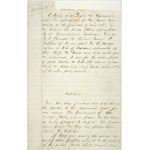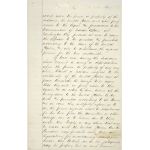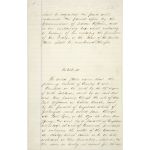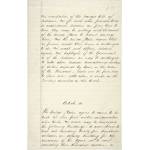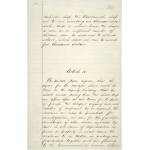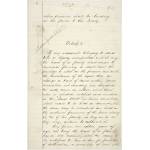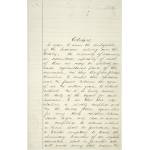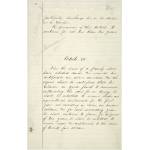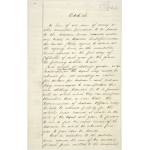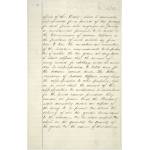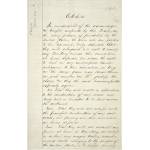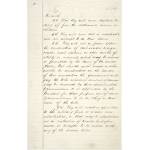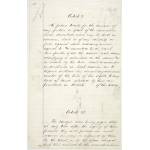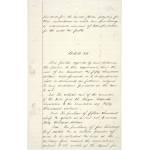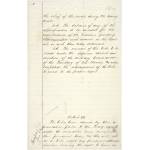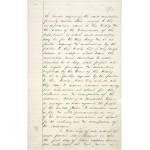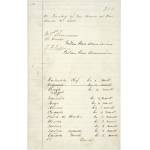Treaty Between the United States Government and the Navajo
6/1/1868
Add to Favorites:
Add all page(s) of this document to activity:
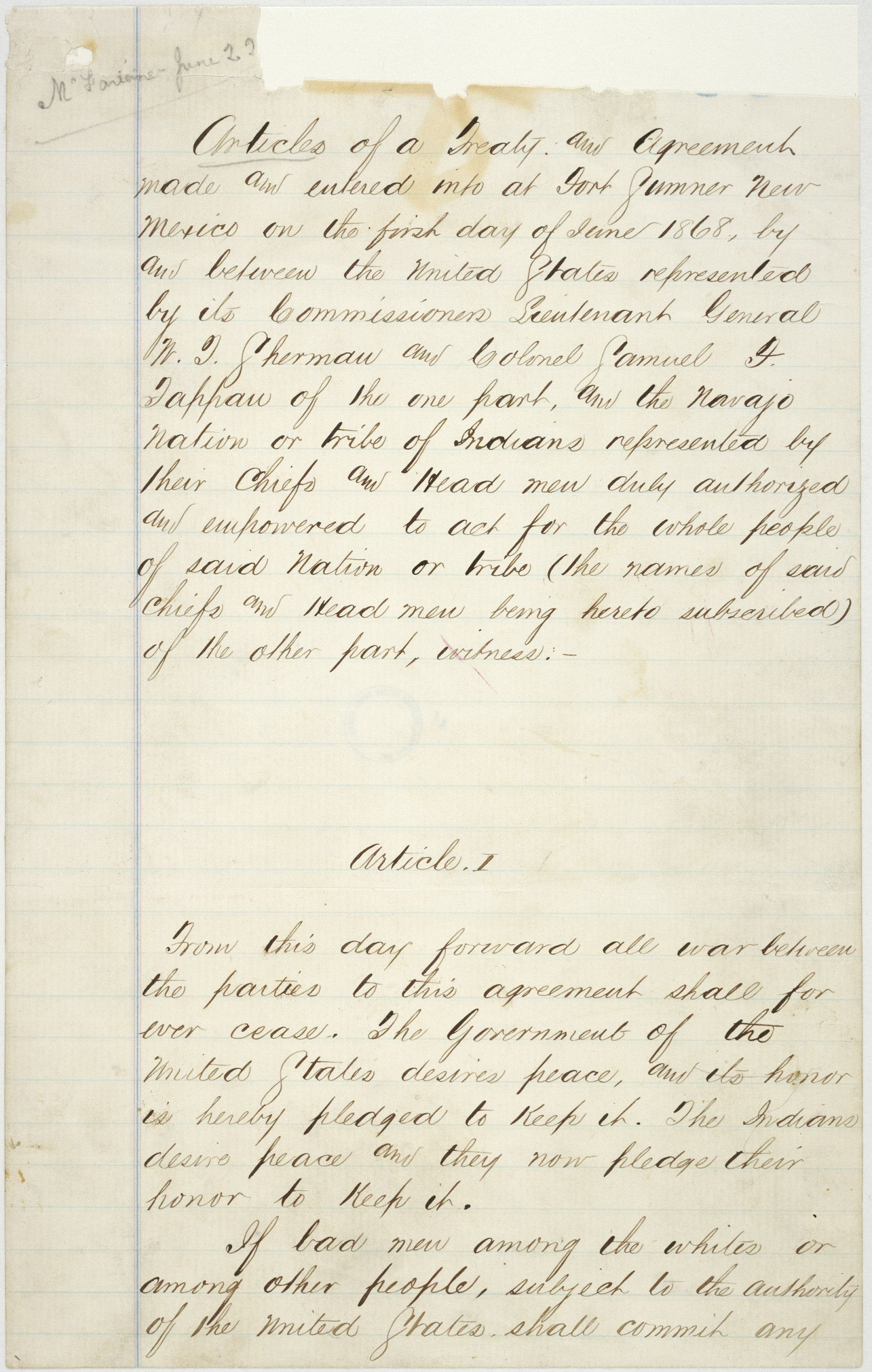
Add only page 1 to activity:
Add only page 2 to activity:
Add only page 3 to activity:
Add only page 4 to activity:
Add only page 5 to activity:
Add only page 6 to activity:
Add only page 7 to activity:
Add only page 8 to activity:
Add only page 9 to activity:
Add only page 10 to activity:
Add only page 11 to activity:
Add only page 12 to activity:
Add only page 13 to activity:
Add only page 14 to activity:
Add only page 15 to activity:
Add only page 16 to activity:
Add only page 17 to activity:
Add only page 18 to activity:
Add only page 19 to activity:
Add only page 20 to activity:
After years of conflict resulting from settlers moving into Navajo lands, the U.S. Army began forcibly removing the Navajo in January 1864, in what became known as the "Long Walk." During this and several other marches that followed over the next few years, the Army moved thousands of Navajo to a reservation at Bosque Redondo in New Mexico Territory (where the military maintained an outpost called Fort Sumner). Many died en route, and others suffered thirst, starvation, exposure, and disease. Thousands more hid from government soldiers in Canyon de Chelly and elsewhere. Once at the reservation, conditions continued to grow worse due to horrible weather, poor crops, and mistreatment.
In late May 1868, U.S. Peace Commissioners Gen. William T. Sherman and Col. Samuel Tappan arrived to negotiate a treaty to resolve the destiny of the Navajo. Navajo chief Barboncito spoke on behalf of his people. After three days of negotiation, Sherman offered a choice between moving to Oklahoma, where other tribes had been relocated, or returning home to Navajo ancestral lands. The Navajo chose thier ancestral lands.
This treaty, signed at Fort Sumner on June 1, 1868, allowed the Navajo to return to their home by designating a portion of their original homeland as the Navajo reservation (see Article 2). The treaty also touches upon education, agriculture, land rights, railroads, forts, the establishment a resident Indian Agent, and other topics. The Senate then approved the treaty and President Andrew Johnson ratified it.
This was one of the last treaties to be signed between Native Americans and the U.S. Government. After the Revolutionary War, the United States had continued the European practice of negotiating treaties with the Native Peoples similarly to how they negotiated with foreign governments. But this practice changed gradually over time. In 1831, the Supreme Court case Cherokee Nation v. Georgia changed the status of Native tribes from "independent, sovereign nations" to "domestic dependent nations." Treaties, however, still followed the pattern of requiring negotiations between the U.S. Government and tribal governments and ratification by Congress. Not all negotiated treaties were ratified.
In 1871, Congress passed the Indian Appropriations Act, which suspended all further treaties with Native governments. After that time, all changes or additions to Native lands or status were conducted by Executive Order, Acts of Congress, and decisions of the Federal Courts. To this day federally recognized American Indian tribes and Alaska Natives retain the right of self-government and usually hold a legal position directly under the Federal Government.
In late May 1868, U.S. Peace Commissioners Gen. William T. Sherman and Col. Samuel Tappan arrived to negotiate a treaty to resolve the destiny of the Navajo. Navajo chief Barboncito spoke on behalf of his people. After three days of negotiation, Sherman offered a choice between moving to Oklahoma, where other tribes had been relocated, or returning home to Navajo ancestral lands. The Navajo chose thier ancestral lands.
This treaty, signed at Fort Sumner on June 1, 1868, allowed the Navajo to return to their home by designating a portion of their original homeland as the Navajo reservation (see Article 2). The treaty also touches upon education, agriculture, land rights, railroads, forts, the establishment a resident Indian Agent, and other topics. The Senate then approved the treaty and President Andrew Johnson ratified it.
This was one of the last treaties to be signed between Native Americans and the U.S. Government. After the Revolutionary War, the United States had continued the European practice of negotiating treaties with the Native Peoples similarly to how they negotiated with foreign governments. But this practice changed gradually over time. In 1831, the Supreme Court case Cherokee Nation v. Georgia changed the status of Native tribes from "independent, sovereign nations" to "domestic dependent nations." Treaties, however, still followed the pattern of requiring negotiations between the U.S. Government and tribal governments and ratification by Congress. Not all negotiated treaties were ratified.
In 1871, Congress passed the Indian Appropriations Act, which suspended all further treaties with Native governments. After that time, all changes or additions to Native lands or status were conducted by Executive Order, Acts of Congress, and decisions of the Federal Courts. To this day federally recognized American Indian tribes and Alaska Natives retain the right of self-government and usually hold a legal position directly under the Federal Government.
Transcript
Articles of a Treaty and Agreement made and entered into at Fort Sumner New Mexico on the first day of June 1868, by and between the United States represented by its Commissioners Lieutenant General W. T. Sherman and Colonel Samuel F. Tappan of the one part, and the Navajo Nation or tribe of Indians represented by their chiefs and Head men duly authorized and empowered to act for the whole people of said Nation or tribe (the names of said chiefs and Head men being hereto subscribed) of the other part, witness. -Article. I
From this day forward all war between the parties of this agreement shall for war cease. The Government of the United States desires peace, and its honor is hereby pledged to keep it. The Indians desire peace and they now pledge their honor to keep it.
If bad men among the whites or among other people, subject to the authority of the United States, shall commit any
wrong upon the person or property of the Indians, the United States will upon proof made to the Agent and forwarded to the Commissioner of Indian Affairs at Washington City proceed at once to cause the offender to be arrested and punished according to the laws of the United States, and also to re-imburse the injured persons for the loss sustained. If bad men among the Indians shall commit a wrong or depredation upon the person or property of any one, white, black, or Indian subject to the authority of the United States and at peace therewith, the Navajo tribe agree that they will on proof made to their agent, and on notice by him, deliver up the wrong-doer to the United States to be tried and punished according to its laws: and in case they willfully refuse so to do, the person injured shall be reimbursed for his loss from the Annuities or other moneys, due or to become due to them under this Treaty, or any others that may be made with the United States. And the President may prescribe such Rules and Regulations for ascertaining damages under this Article as in his judgment may be proper; but not such damage
shall be adjusted and paid until examined and passed upon by the Commissioner of Indian Affairs, and no one sustaining loss whilst violating or because of his violating the provisions of this Treaty, or the Laws of the United States shall be reimbursed therefor.
Article II
The United States agrees that the following District of Country to wit- Bounded on the north by the 34° degree of North Latitude, south by an east and west line passing through the site of Old Fort Defiance in Cañon Bonito, east by the parallel of longitude which if prolonged south would pass through old Fort Lyon, or the Ojo-de-oso, Bear Spring, and west by a parallel of longitude about 109° 30' west of Greenwich provided it embraces the outlet of the Canon-de-chilly, which cañon is to be all included in this Reservation, shall be, and the same is hereby set apart for the use
and occupation of the Navajo tribe of Indians, and for such other friendly tribes or individual Indians as from time to time they may be willing with the consent of the United States to admit among them; and the United States agrees that no persons except those herein so authorized to do, and except such officers, soldiers, agents, and employe's of the Government or of the Indians as may be authorized to enter upon Indian Reservations in discharge of duties imposed by law, or the orders of the President, shall ever be permitted to pass over; settle upon, or reside in the territory described in this Article.
Article. III
The United States agrees to cause to be built at some point within said reservation where timber and water may be convenient the following buildings: a ware-house to cost not exceeding twenty five hundred dollars, an agency building for the residence of the Agent not to cost exceeding three thousand dollars, a
carpenters shop, and blacksmiths ship not to cost exceeding one thousand dollars each; and a school house and chapel, as soon as a sufficient number of children can be induced to attend school, which shall not cost to exceed five thousand dollars.
Article IV
The United States agrees, that the agent for the Navajos shall make his home at the Agency building, that he shall reside among them and shall keep an office open at all times for the purpose of prompt and diligent inquiry into such matters of complaint by or against the Indians as may be presented for investigation, as also for the faithful discharge of other duties enjoined by law. In all cases of depredation on person or property he shall cause the evidence to be taken in writing and forwarded together with his finding to the Commissioner of Indian Affairs
whose decision shall be binding on the parties to this Treaty.
[written on the diagonal: Kerr June 22, 1868]
Article V
If any individual belonging to said tribe or legally incorporated with it, being the head of a family shall desire to commence farming he shall have the privilege to select in the presence and with the assistance of the Agent then in charge a tract of land within said reservation not exceeding one hundred and sixty acres in extent, which tract where so selected, certified and recorded in the "Land Book" as herein described, shall cease to be held in common, but the same may be occupied and held in the exclusive possession of the person selecting it, and of his family, so long as he or they may continue to cultivate it.
Any person over eighteen years of age, not being the head of a family, may in like manner, select and cause to be certified to, him or her: for purposes of cultivation, a quantity of land not
exceeding eighty acres in extent, and thereupon be entitled to this exclusive possession of the same as above directed.
For each tract of land so selected a certificate containing a description thereof and the name of the person selecting it, with a certificate endorsed thereon that the same has been recorded shall be delivered to the party entitled to it, by the agent, after the same shall have been recorded by him, in a book to be kept in his office, subject to inspection, which said book shall be known as the "Navajo Land Book."
The President may at any time, order a survey of the reservation, and, when so surveyed, Congress shall provide for protecting the rights of said settlers in their improvements and may fix the character of the title held by each. The United States may pass such laws on the subject of alienation and descent of property between the Indians and their descendants as may be thought proper.
Article VI
In order to insure the civilization of the Indians entering into this treaty, the necessity of education is admitted, especially of such of them as may be settled on said agricultural parts of this reservation, and they therefore pledge themselves to compel their children male and female between the ages of six and sixteen years, to attend school, and it is hereby made the duty of the agent for said Indians, to see that this stipulation is strictly complied with and the United States agrees that for every thirty children between said ages who can be induced or compelled to attend school a house shall be provided, and a teacher competent to teach the elementary branches of an english education; shall be furnished who will reside among said Indians and
faithfully discharge his or her duties as a teacher.
The provisions of this article to continue for not less than ten years.
[illegible notes in left margin in different handwriting, including "June 22-"]
Article. VII
When the head of a family shall have selected lands and received his certificate as above directed and the agent shall be satisfied that he intends in good faith to commence cultivating the soil for a living, he shall be entitled to receive seeds and agricultural implements for the first year not exceeding in value one hundred dollars, and for each succeeding year he shall continue to farm, for a period of two years, he shall be entitled to receive seeds and implements to the value of twenty five dollars.
Article. VIII
In liew of all the sums of money or other annuities provided to be paid to the Indians herein named under any treaty or treaties heretofore made, the United States agrees to deliver at the agency house on the reservation herein named on the first day of September of each year for ten years the following articles to wit:
Such articles of clothing, goods, or raw materials in liew therefof as the agent may make his estimate for, not exceeding in value five dollars per Indian, each Indian being encouraged to manufacture their own clothing, blankets, etc.; to be furnished with no article which they can manufacture themselves. And, in order that the Commissioner of Indian Affairs may be able to estimate properly for the articles herein named, it shall be the duty of the Agent each year, to forward to him a full and exact census of the Indians, on which the estimate from year to year can be based.
And in addition to the articles herein named, the sum of ten dollars for each person entitled to the beneficial
effects of this treaty, shall be annually appropriated for a period of ten years for each person who engages in farming or mechanical pursuits to be used by the Commissioner of Indian Affairs in the purchase of such articles as from time to time the condition and necessities of the Indians may indicate to be proper: and if within the ten years at any time, it shall appear that the amount of money needed for clothing, under the article can be appropriated to better uses for the Indians named herein, The Commissioners of Indian Affairs may change the appropriation to other purposes, but in no event shall the amount of this appropriation be withdrawn or discontinued for the period named provided they remain at peace. And the President shall annually detail an officer of the army to be present and attest the delivery of all the goods herein named to the Indians, and he shall inspect and report on the quantity and quality of the goods and the manner of their delivery
["Boyd June 22" in left margin in different handwriting]
Article IX
In consideration of the advantages and benefits conferred by this Treaty, and the many pledges of friendship by the United States, the tribes who are parties to this agreement, hereby stipulate that they will relinquish all right to occupy any Territory outside their reservation, as herein defined, but retain the right to hunt on any unoccupied lands contiguous to their reservation, so long as the large game may range thereon in such numbers as to justify the chase, and they the said Indians further expressly agree:
1st That they will make no oppositions to the construction of rail-roads now being built or hereafter to be built across the continent
2nd: That they will not interfere with the peaceful construction of any rail-road, not passing over their reservation, as herein defined
3rd. That they will not attack any persons at home or travelling, nor molest or disturb any wagon trains, coaches, mules or cattle belonging to the people of the United States, or to persons friendly
Therewith
4th That they will never capture, or carry off from the settlements women or children
5th They will never kill or scalp white men nor attempt to do them harm
6th They will not in the future oppose the construction of rail-roads, wagon roads, mail stations or other works of utility or necessity which may be ordered or permitted by the laws of the United States; But should such roads or other works be constructed on the lands of their reservation the government will pay the tribe whatever amount of damage may be assessed by three disinterested Commissioners to be appointed by the President for that purpose, one of said Commissioners to be a Chief or Head man of the tribe
7th They will make no opposition to the military posts or roads now established, or that may be established not in violation of treaties heretofore made or hereafter to be made with any of the Indian tribes
["Dennison June 22" in left margin in different handwriting]
Article X
No future treaty for the cession of any portion or part of the reservation herein described, which may be held in common, shall be of any validity or force against said Indians, unless agreed to and executed by at least three-fourths of all the adult male Indians occupying or interested in the same; and no cession by the tribe shall be understood or construed in such manner as to deprive without his consent any individual member of the tribe of his rights to any tract of land selected by him as provided in Article [left blank] of this treaty.
Article XI
The Navajos also hereby agree that at any time after the signing of these presents they will proceed in such manner as may be required of them by the agent, or by the officer charged with their removal to the reservation herein
provided for, the United States paying for their subsistence en-route, and providing a reasonable amount of transportation for the sick and feeble
Article XII
It is further agreed by and between the parties to this agreement; that the sum of one hundred and fifty thousand dollars appropriated or to be appropriated shall be disbursed as follows, subject to any conditions provided in the law to wit:
1st The actual cost of the removal of the tribe from the Bosque Redondo Reservation to the reservation say Fifty thousand dollars
2nd: The purchase of fifteen thousand sheep and goats at a cost not to exceed Thirty thousand dollars
3rd: The purchase of five hundred beef cattle and a million pounds of corn, to be collected and held at the military post nearest the reservation, subject to the orders of the Agent for
the relief of the needy during the coming winter
4th. The balance if any of the appropriation to be invested for the maintenance of the Indians pending their removal in such manner as the agent who is with them may determine.
5th The removal of this tribe to be made under the supreme control and direction of the Military Commander of the Territory of New Mexico, and when completed the management of the tribe to revert to the proper agent.
Article. XIII
The tribes herein named by their representatives, parties to this Treaty agree to make the reservation herein described their permanent home, and they will not as a tribe make any permanent settlement elsewhere – reserving the right to hunt on
["Franklin June 22" in left margin in different handwriting]
the lands adjoining the said reservation formerly called theirs – subject to the modifications named in this treaty and the order of the Commander of the Department in which said reservation may be for the time being and it is further agreed and understood by the parties to this treaty that if any Navajo Indian or Indians shall leave the reservation herein described to settle elsewhere he or they shall forfeit all the rights privileges and annuities conferred by the terms of this treaty and it is further agreed by the parties to this treaty – that they will do all they can to induce Indians now away from reservations set apart for the exclusive use and occupation of the Indians – leading a nomadic life – or engaged in war against the people of the United States – to abandon such a life and settle permanently in one of the territorial reservations set apart for the exclusive use and occupation of the Indians.
In testimony of all which the said parties have hereunto on this the first day of June eighteen hundred and sixty eight at Fort Sumner in
the Territory of New Mexico set their hands and seals.
W.T. Sherman
Lt Genl.
Indian Peace Commissioner
S.F Tappan
Indian Peace Commissioner
["Hall June 22" in left margin in different handwriting]
Barboncito. Chief his x mark
["Delgadito hix x mark" crossed out]
Armijo his x mark
Delgado
Manuelito his x mark
Largo his x mark
Herrero his x mark
Chiqueto his x mark
Muerto de Hombre his x mark
Hombro his x mark
Narbono his x mark
Narbono segundo his x mark
Gañado Mucho his x mark
Council
Riquo his x mark
Juan Martín his x mark
Serginto his x mark
Grande his x mark
Inoetenito his x mark
Muchachos Mucho his x mark
Chiqueto Sequndo his x mark
Cabello Amarillo his x mark
Francisco his x mark
Torivio his x mark
Desdendado his x mark
Juan his x mark
Guero his x mark
Gugadore his x mark
Cabason his x mark
Barbon Segundo his x mark
Cabares Colorados his x mark
["Caton June 22d" in left margin in different handwriting]
Attest:
Geo. W. Getty
Col 37th Infy
Br Maj Genl. U.S.A.
B.S. Roberts
Bt Brig Genl USA
Lt Col 3d Cavy
J Cooper McKee
Bt. Lt. Col. Surgeon U.S.A.
Theo. H. Dodd
U.S Indian agt for Navajos
Chas. McClure
Bt. Maj. & C.S.U.S.A.
James F Weeds
Bvt Maj & Asst Surg USA
J.C. Sutherland
Intepreter
William Vaux
Chaplain U.S.A.
This primary source comes from the Records of the U.S. Government.
National Archives Identifier: 6173067
Full Citation: Treaty between the United States Government and the Navajo Indians signed at Fort Sumner, New Mexico Territory on June 1, 1868 (Ratified Indian Treaty #372, 15 STAT 667); 6/1/1868; Ratified Indian Treaty 372: Navaho (Navajo) - Fort Sumner, New Mexico, June 1, 1868; Indian Treaties, 1722 - 1869; Records of the U.S. Government, Record Group 11; National Archives Building, Washington, DC. [Online Version, https://docsteach.org/documents/document/navajo-treaty-1868, April 20, 2024]Rights: Public Domain, Free of Known Copyright Restrictions. Learn more on our privacy and legal page.



